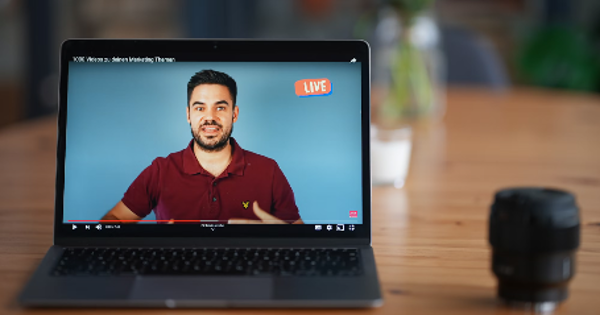5/22/2024
SEO, short for Search Engine Optimization, is an important aspect of growing your online presence as a business owner. By implementing effective SEO strategies, you can improve your website's visibility, attract more organic traffic, and ultimately increase your customer base.
In this comprehensive guide, we will explore various SEO strategies suited for business owners, along with free SEO tools that can help you achieve your online goals.
Key Takeaways
- Conduct Thorough Keyword Research
- Optimize On-Page SEO
- Build a Strong Backlink Profile (Off-Page SEO)
- Optimize for Local SEO
- Mobile Optimization
- Content Marketing Strategy
- Website Speed Optimization
- Utilize Analytics for Continuous Improvement
Introduction: Why SEO Matters for Business Owners

SEO Scrabble Tiles on Brown Wooden Surface - Pexels - Pixabay
Establishing a strong online presence is a must for business owners. SEO, standing for Search Engine Optimization, is one of the most important factors for accomplishing online success. It revolves around a series of techniques and tactics designed to enhance your website's visibility and rankings on search engine result pages (SERPs).
By appearing on the first page of search results, you significantly increase your chances of attracting organic traffic and potential customers. In this article, we will dive into the SEO for business owners, giving you invaluable strategies and free SEO tools for business owners that will take your online presence to new heights.
Understanding Search Engine Algorithms

Google Logo Identity - Photo by BoliviaInteligente on Unsplash
To craft effective SEO strategies, it's crucial to understand how search engine algorithms work. These complex algorithms are like the heartbeat of the internet, determining the fate of websites. Search engines analyze numerous factors to discover the relevance, authority, and trustworthiness of websites.
These factors include the strategic use of keywords, the quality and quantity of backlinks, user experience metrics, and the overall performance of your website. By unraveling the mystery of these algorithms, you can adapt your SEO efforts to align with the search engines' requirements and improve your website's chances of ranking higher on SERPs.
Keyword Research: The Foundation of SEO

magnifying glass near gray laptop computer - Unspash- Agence Olloweb
It is the foundation upon which your entire SEO strategy is built. Conducting thorough keyword research involves identifying the words and phrases your target audience uses when searching for products, services, or information related to your business.
Armed with this knowledge, you can strategically optimize your website's content and meta tags to align with the search intent of potential customers. Thankfully, several free SEO tools, such as Google Keyword Planner and Ubersuggest, are at your disposal to ease the process and give you invaluable insights.
On-Page SEO: Optimizing Your Website
On-page SEO revolves around optimizing individual web pages to make them more search-engine-friendly and user-centric. This involves crafting compelling meta titles and descriptions that entice users to click, incorporating relevant keywords throughout your content, and utilizing descriptive headings to structure your information effectively.
Moreover, focusing on providing valuable and engaging content that addresses the needs of your target audience will not only please search engines but also keep your visitors coming back for more.
Off-Page SEO: Building Your Online Reputation

grey metal chain on white background - Unsplash - Edge2Edge Media
Unlike on-page SEO, which deals with the elements within your website, off-page SEO focuses on external factors that influence your website's reputation and authority. Building a strong backlink profile is one of the cornerstones of off-page SEO.
The more reputable websites linking back to your content, the more search engines perceive your website as trustworthy and relevant. Engaging in guest posting, actively participating in social media, and collaborating with influencers are powerful off-page SEO tactics that can set your website on the path to success.
Local SEO: Attracting Local Customers

Handwritten Small Business Marketing - Pexels - Eva Bronzini
If your business has a physical presence, mastering local SEO is close to planting a flag in your community's digital landscape. Local SEO targets customers in specific geographic locations, optimizing your website to appear in local searches. This is particularly valuable for businesses with brick-and-mortar stores, restaurants, or service centers.
To maximize your local SEO efforts, ensure that your business information is accurate and consistent across online directories, register with Google My Business, and encourage customers to leave reviews, as positive reviews can significantly boost your local SEO rankings.
Mobile Optimization: Reaching On-the-Go Customers

person holding space gray iPhone - Unsplash - Kenny Eliason
In this fast-paced era, people are always on the move, and their smartphones are their constant companions. Consequently, mobile optimization has become an integral part of SEO strategy. A mobile-friendly website ensures that visitors can easily navigate, read, and interact with your content on their mobile devices without any hassle.
This seamless user experience encourages longer visit durations and lower bounce rates, both of which are vital for earning favor with search engines and securing higher rankings on SERPs.
Content Marketing: Driving Organic Traffic
Content Marketing is a powerful technique that involves creating and distributing valuable and relevant content to attract and engage your target audience. Content comes in various forms, such as blog posts, articles, infographics, videos, and podcasts, giving you the flexibility to cater to different user preferences.
The key is to focus on producing high-quality content that not only informs but also entertains, inspires, or solves problems. By consistently delivering valuable content, you can earn the trust and loyalty of your audience, improve user engagement, and boost your organic traffic.
Website Speed: Improving User Experience

person using macbook pro on white table - Unsplash - Myriam Jessier
Speed is a must. Your website's loading speed can make or break the user experience, and by extension, your SEO rankings. Studies have shown that users are highly sensitive to slow-loading websites, with most visitors abandoning a page that takes more than a few seconds to load.
To ensure a smooth and enjoyable browsing experience, optimize your website's loading speed by compressing images, minifying code, and leveraging browser caching. This seemingly minor enhancement can lead to significant improvements in user satisfaction, engagement, and ultimately, your website's search engine rankings.
Analytics and Tracking: Measuring SEO Success
In the business sphere, success is measured by concrete data and actionable insights. The same principle applies to SEO. Implementing SEO strategies without tracking their effectiveness is close to navigating uncharted waters without a compass. To ensure you are on the right track, it's essential to utilize analytics tools like Google Analytics.
These tools provide valuable data on website traffic, user behavior, bounce rates, conversion rates, and much more. Armed with this data, you can analyze your SEO performance, identify areas for improvement, and make informed decisions to refine your strategies.
Leveraging Social Media: Expanding Your Reach

We like you too quotes on wall - Unsplash - Adam Jang
Social media has evolved from a mere communication tool to a powerful marketing platform. As a business owner, tapping into the potential of social media can amplify your online presence and reach a broader audience. Establishing a robust social media presence involves creating engaging content, interacting with your followers, and fostering a community around your brand.
Social media platforms offer unique opportunities for businesses to connect with their target audience, understand their preferences, and respond to their needs. By sharing valuable content and engaging with your followers regularly, you can build a loyal fan base and strengthen your online authority.
Video Marketing: Capturing Audience Attention

black laptop computer on brown wooden table - Unsplash - Malte Helmhold
Video marketing stands out as a dynamic and engaging medium to capture audience attention. Visual content is known to leave a lasting impact on viewers, making video marketing a potent tool to communicate your brand message effectively.
With platforms like YouTube witnessing exponential growth, businesses have unparalleled opportunities to showcase their products, services, and expertise through video content. By creating informative, entertaining, or inspirational videos, you can forge a deep connection with your audience, foster brand loyalty, and drive traffic to your website.
User Experience (UX): Improving Website Usability
User experience makes your website stand out among the millions of others on the internet. Providing an exceptional user experience is no longer an option but a necessity. A user-friendly website not only satisfies the needs of your visitors but also earns favor with search engines.
To enhance user experience, focus on intuitive navigation, clear calls-to-action, and visually appealing design. Ensure that your website is responsive across various devices, and optimize loading times to prevent visitors from drifting away. By prioritizing user experience, you can foster a positive relationship with your audience, boost engagement, and keep users coming back for more.
Rich Snippets and Featured Snippets: Standing Out in SERPs

multicolored serp wooden ornament - Unsplash - Merakist
Standing out in the search engine result pages (SERPs) is the key to attracting the attention of potential customers. Rich snippets and featured snippets are like neon signs that highlight your listing, making it more enticing to users. Rich snippets provide additional information, such as ratings, reviews, and product details, directly on the search results page.
Featured snippets, on the other hand, are brief, informative summaries that appear at the top of SERPs. By optimizing your content with structured data markup and providing valuable information, you increase your chances of appearing in these snippets and earning more clicks.
Link Building Strategies: Building Authority
Link building is the backbone of off-page SEO. They act like currency on the internet, backlinks from reputable websites signal your website's authority and credibility to search engines. A strong backlink profile significantly boosts your chances of ranking higher on SERPs and attracting organic traffic.
Engaging in guest posting, outreach campaigns, and collaborations with influencers are effective link building strategies to earn quality backlinks. By building a network of links, you cement your website's position as a trustworthy source of information, contributing to the growth of your online presence.
Conclusion
In conclusion, SEO is a game-changer for business owners looking to grow their online presence. By understanding search engine algorithms, conducting thorough keyword research, optimizing on-page and off-page factors, and leveraging social media and content marketing, you can enhance your website's visibility and attract a broader audience.
Remember, implementing free SEO tools and continuously monitoring your website's performance through analytics are essential for refining your strategies and achieving long-term success. So, start practicing SEO and take your business to new heights!
Frequently Asked Questions
SEO, or Search Engine Optimization, is crucial for business owners as it improves a website's visibility, attracts organic traffic, and expands the customer base. It's a key factor in establishing a strong online presence.
Search engine algorithms determine website rankings based on factors like keywords, backlinks, and user experience. Understanding these algorithms helps align SEO efforts with search engines' requirements, improving the chances of higher rankings on SERPs.
Keyword research is foundational, involving identifying terms your audience uses in searches. Tools like Google Keyword Planner and Ubersuggest help find relevant keywords, and incorporating them strategically improves search visibility.
On-page SEO focuses on optimizing individual web pages for search engines and users. It involves crafting compelling meta titles, incorporating keywords, and providing valuable content that addresses audience needs.
Off-page SEO enhances a website's reputation. A strong backlink profile from reputable sites signals trustworthiness to search engines. Guest posting, social media engagement, and influencer collaborations are effective strategies.
Local SEO targets specific geographic locations, optimizing a website for local searches. This is valuable for businesses with physical stores. Consistent business information, Google My Business registration, and positive reviews enhance local SEO.
Mobile optimization ensures a seamless user experience on mobile devices, improving visit duration and lowering bounce rates. This positively influences search engine rankings and caters to the needs of on-the-go users.
Content marketing involves creating and distributing valuable content to attract and engage audiences. Content can include blog posts, articles, infographics, videos, and podcasts. High-quality content builds trust, improves engagement, and boosts organic traffic.
Website speed impacts user satisfaction and SEO rankings. Optimizing by compressing images, minifying code, and leveraging browser caching enhances user experience, reducing bounce rates and improving search engine rankings.
Analytics tools like Google Analytics provide data on website traffic, user behavior, and conversions. Business owners can analyze this data to measure SEO performance, identify areas for improvement, and make informed decisions to refine strategies.
Social media amplifies online presence, providing opportunities to engage with a broader audience. Creating engaging content, interacting with followers, and building a community strengthen brand authority, contributing to overall SEO success.
UX is vital for SEO as search engines prioritize user-friendly websites. Prioritize intuitive navigation, clear calls-to-action, and responsive design. Enhancing UX fosters positive relationships with users, improving engagement and search rankings.

